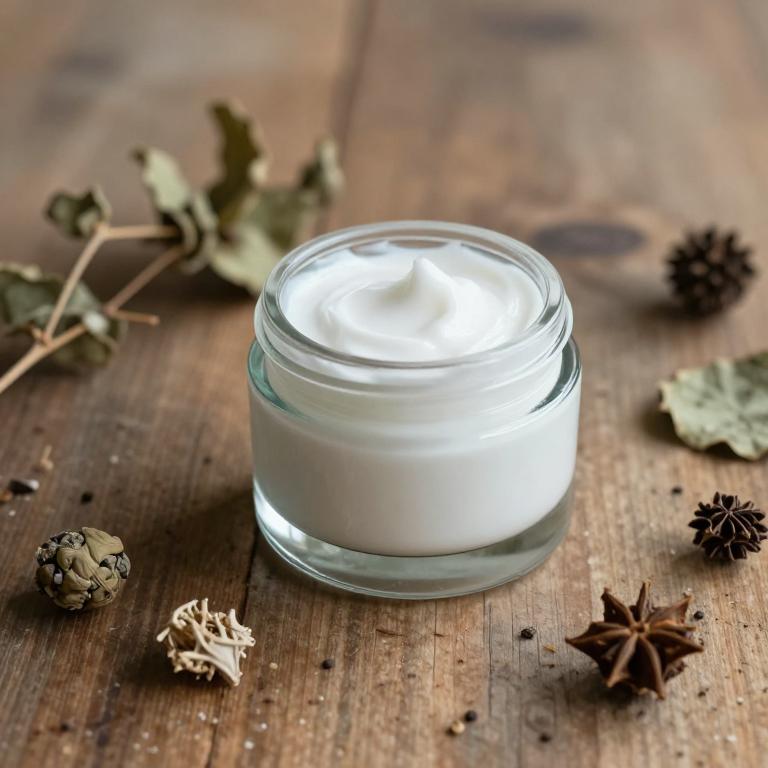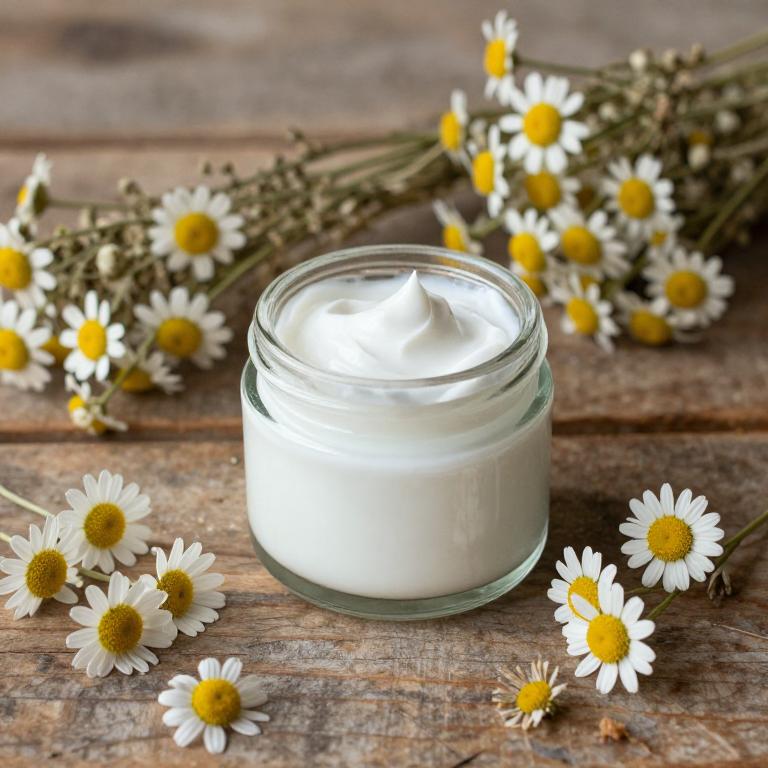10 Best Herbal Creams For Oily Face

Herbal creams for oily faces are formulated with natural ingredients like neem, aloe vera, green tea, and sandalwood, which help regulate sebum production and reduce excess oiliness.
These creams are typically lightweight and non-comedogenic, making them suitable for daily use without clogging pores. They often contain antibacterial and anti-inflammatory properties that can help prevent breakouts and soothe skin irritation. Regular use of herbal creams can improve skin texture and provide a matte finish, contributing to a clearer complexion.
Additionally, they are a gentle alternative to chemical-laden products, making them ideal for those seeking natural skincare solutions.
Table of Contents
- 1. Aloe vera (Aloe barbadensis)
- 2. Salvia (Salvia officinalis)
- 3. Dog rose (Rosa canina)
- 4. Ginger (Zingiber officinale)
- 5. Centella (Centella asiatica)
- 6. St. john's wort (Hypericum perforatum)
- 7. English lavender (Lavandula angustifolia)
- 8. Chamomile (Matricaria chamomilla)
- 9. Chaste tree (Vitex agnus-castus)
- 10. Blessed thistle (Cnicus benedictus)
1. Aloe vera (Aloe barbadensis)

Aloe barbadensis, commonly known as aloe vera, is a natural ingredient widely used in herbal creams for oily skin due to its soothing and hydrating properties.
These creams help to balance oil production by regulating sebum secretion without leaving a greasy residue. They also contain anti-inflammatory agents that can reduce redness and irritation associated with oily skin. Additionally, aloe vera has antibacterial properties that may help prevent acne breakouts on the face.
For individuals with oily skin, aloe-based creams offer a gentle yet effective solution for maintaining clear, refreshed skin.
2. Salvia (Salvia officinalis)

Salvia officinalis, commonly known as sage, is a herbal ingredient often used in facial creams formulated for oily skin.
These creams are designed to regulate sebum production, helping to reduce excess oiliness and prevent breakouts. Sage contains antibacterial and anti-inflammatory properties that can soothe irritated skin and promote a clearer complexion. The natural compounds in salvia officinalis also help to tighten pores and improve skin texture, making it a popular choice for those with acne-prone or oily skin.
Incorporating salvia officinalis herbal creams into a skincare routine can offer a gentle yet effective approach to managing oily skin concerns.
3. Dog rose (Rosa canina)

Rosa canina, also known as rosehip, is a popular herbal ingredient known for its rich content of essential fatty acids, vitamins, and antioxidants, making it highly beneficial for skin health.
When used in herbal creams for oily skin, rosa canina helps to balance sebum production and reduce excess oil without stripping the skin of its natural moisture. These creams are often formulated with other soothing ingredients like aloe vera or chamomile to enhance their calming and anti-inflammatory effects. The lightweight texture of rosa canina creams makes them ideal for oily skin types, as they are easily absorbed and do not leave a greasy residue.
Regular use of such creams can help improve skin texture, reduce the appearance of acne, and promote a clearer, more radiant complexion.
4. Ginger (Zingiber officinale)

Zingiber officinale, commonly known as ginger, is a popular herbal ingredient used in the formulation of natural creams for oily skin due to its anti-inflammatory and antioxidant properties.
These creams often contain ginger extract, which helps regulate sebum production and reduce excess oiliness on the face. The warming effect of ginger can also enhance blood circulation, promoting a clearer and more radiant complexion. Additionally, zingiber officinale has antimicrobial properties that can help combat acne-causing bacteria, making it beneficial for those with oily, acne-prone skin.
When used consistently, these herbal creams can help balance skin texture and minimize the appearance of blemishes without clogging pores.
5. Centella (Centella asiatica)

Centella asiatica, also known as gotu kola, is a popular herbal ingredient known for its skin-soothing and regenerative properties.
When incorporated into facial creams, it can help balance oil production and reduce excess sebum on oily skin. These creams often contain other natural ingredients like aloe vera or green tea to enhance their calming and anti-inflammatory effects. They are particularly beneficial for individuals with acne-prone or sensitive skin, as they help control shine without causing irritation.
Regular use of centella asiatica herbal creams can lead to a clearer, more balanced complexion over time.
6. St. john's wort (Hypericum perforatum)

Hypericum perforatum, commonly known as St. John's Wort, is often used in herbal creams for its potential skin-soothing and anti-inflammatory properties.
These creams are particularly beneficial for individuals with oily skin, as they may help regulate sebum production and reduce excess oiliness. The active compounds in Hypericum perforatum, such as hyperforin and hypericin, are believed to have antimicrobial and antioxidant effects that can improve skin health. When applied topically, these herbal creams can help minimize acne breakouts and promote a clearer complexion.
However, it is important to consult with a dermatologist before using St. John's Wort products, especially if you are on other medications, due to potential interactions.
7. English lavender (Lavandula angustifolia)

Lavandula angustifolia, commonly known as English lavender, is often incorporated into herbal creams designed for oily skin due to its soothing and anti-inflammatory properties.
These creams help regulate sebum production, reducing excess oiliness without stripping the skin of its natural moisture. The calming fragrance of lavender also provides a relaxing effect, making it ideal for use in skincare routines. Additionally, lavender contains antioxidants and antibacterial agents that can help prevent acne and improve overall skin texture.
For individuals with oily skin, lavender-based creams offer a natural, effective solution to maintain a balanced and healthy complexion.
8. Chamomile (Matricaria chamomilla)

Matricaria chamomilla, commonly known as chamomile, is a popular herbal ingredient used in the formulation of creams for oily skin due to its calming and anti-inflammatory properties.
These creams often contain chamomile extract, which helps to soothe irritation and reduce redness on the face. Chamomile is also known for its ability to regulate sebum production, making it particularly effective for individuals with oily or acne-prone skin. The natural antioxidants in chamomile help to protect the skin from environmental stressors while maintaining a balanced moisture level.
Overall, matricaria chamomilla herbal creams offer a gentle, natural solution for managing oily skin and promoting a clearer, more balanced complexion.
9. Chaste tree (Vitex agnus-castus)

Vitex agnus-castus, commonly known as chasteberry, is a herbal ingredient often used in skincare products for its potential benefits for oily skin.
Herbal creams containing vitex agnus-castus are formulated to help regulate sebum production, which can reduce excess oiliness on the face. These creams may also help soothe inflammation and redness, making them suitable for acne-prone skin. The plant's phytoestrogens are believed to support hormonal balance, which can contribute to clearer and more balanced skin.
When choosing such creams, it is important to look for products that are non-comedogenic and suitable for sensitive or oily skin types.
10. Blessed thistle (Cnicus benedictus)

Cnicus benedictus, commonly known as blessed thistle, is a traditional herbal remedy often used in the formulation of herbal creams for oily skin.
These creams are designed to regulate sebum production, reduce excess oiliness, and prevent acne breakouts on the face. The active compounds in Cnicus benedictus possess anti-inflammatory and antimicrobial properties that help soothe and protect the skin. When applied topically, the cream can help balance skin texture and improve overall skin clarity.
However, it is important to perform a patch test before use, as some individuals may experience irritation due to the plant's natural compounds.